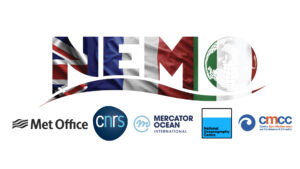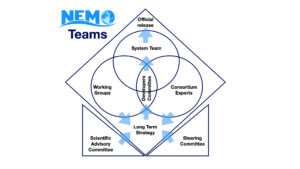Organisation of sustainable development
NEMO Consortium Agreement states:
The purpose of this Agreement is to set up appropriate arrangements for the successful and sustainable development of the NEMO System as a well-organised, state-of-the-art ocean model code system suitable for both research and operational work.
NEMO is used for oceanic research, ocean forecasts and climate studies, covering a wide range of spatial and temporal scales. The NEMO Consortium thus ensures the sustainable development of NEMO to support the variety of user needs. An institution joining the Consortium commits to dedicate a minimum of one man-year per year into the NEMO System Team (responsible for the development and distribution of the NEMO code and documentation).
The NEMO Consortium currently comprises of 5 partners: the Centro Euro-Mediterraneo sui Cambiamenti Climatici (CMCC), the Centre National de la Recherche Scientifique (CNRS), Mercator Océan International (MOI), the UK Met Office (UKMO) and the National Oceanographic Centre (NOC).

Every 5 years, the consortium defines the multi-year development strategy that is implemented by the System Team on a yearly basis in order to advance progress and release a new code versions.
Working groups are created to gather community expertise to advise on NEMO development activities and each group is responsible for a chapter in the development strategy. Once the objectives of the group have been fulfilled, it can be disbanded and energies directed to a new area of focus.
The diagram below illustrates how the various NEMO Teams contribute to the Long Term Development strategy and the issuing of official releases of the code.

The Steering Committee agrees on the tasks on the NEMO System Team’s (NST) annual work-plan, seeks funding opportunities and is responsible for delivery of staff resources to the System Team.
The Scientific Advisory Committee is tasked with providing objective review and comment to ensure NEMO remains a state-of-the-art ocean model. This group is consulted on a 3-5 year period to advise on strategy, work-plans and promote international collaborations. More info here.
The Working Groups (WGs), with assistance from NST members, propose and help to carry-out work in their areas of expertise. See the current list of WGs here.
There are 5 Consortium Experts, one representative from each of the NEMO partner institutes. These individuals represent the interests of their institutions and guide the “drivers and requirements” of the NEMO framework according the to needs of their respective user base.
The Developers Committee are comprised of the Working Group Leaders, the NEMO Officers and the Consortium Experts. This group is responsible for leading the writing of the the NEMO Development Strategy and reviewing the NST annual work-plan. More info here.
The NEMO System Team undertakes the maintenance and development of the NEMO code along with updating the accompanying documentation and user guide. Their activities are informed by the Long Term Strategy in order to produce regular new versions (official releases) of the code. Each of the partner institutes choose a NEMO Officer to provide an avenue of efficient communication between themselves and the NEMO Project Manager. The NEMO Officers are in charge of leading the authorship of the annual work-plans.
